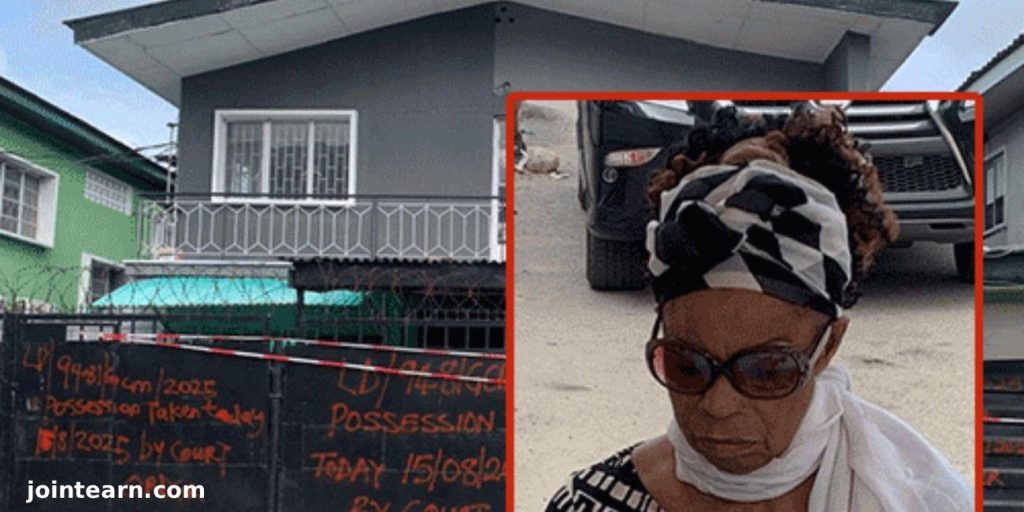
Veteran Nigerian musician Uche Ibeto, popularly known as “The Jigida Queen,” has petitioned the National Judicial Council (NJC), accusing a Lagos State High Court judge, Justice O.O. Adewumi-Oshin, of misconduct and complicity in a judgment that allegedly led to her illegal eviction from her late mother’s home in Surulere, Lagos.
In the petition dated November 4, 2025, and obtained by SaharaReporters, the 70-year-old singer alleged that the judge colluded with land grabbers, lawyers, and court officials to dispossess her of the family property located on Ibezim Obiajulu Street, Off Marsha Road, Surulere.
Ibeto claimed the judgment in Suit No: LD/9481GCM/2025 — Cecil Ezem Osakwe vs. Laura C. Okoh & Ifeoma Stella Ilodibe was “fraudulent and obtained through deceit, impersonation, and forged documents.” She further alleged that neither she nor her tenants were served with court papers before being violently evicted.
Forced Eviction and Ordeal
In September, SaharaReporters reported that Ibeto had decried her eviction, lamenting that she had been “squatting from place to place” since August 15, 2025, when police officers, thugs, and court sheriffs forcibly removed her from the property under a court order.
The singer, who said she had lived in the house with her late mother for over five decades, maintained that the eviction was unlawful and that four tenants, including a law firm, were also displaced.
“At 70, I am homeless because of corruption in the judiciary. I have lost my personal belongings and peace of mind. The system meant to protect me has instead destroyed me,” Ibeto wrote in her petition.
Disputed Ownership and Questionable Proceedings
According to the petition, the Surulere property belonged to Ibeto’s late mother, who had three children — Laura C. Okoh, Ifeoma Stella Ilodibe, and Uche Ibeto. A Letter of Administration was granted to the two elder sisters, but it excluded the Surulere house from the estate.
Despite this, a businessman, Cecil Ezem Osakwe, allegedly claimed to have purchased the property from the two administrators and sued them for possession. Ibeto said the case was filed, heard, and decided within one month, a pace she described as “highly suspicious.”
She alleged that Justice Adewumi-Oshin granted ownership and possession to Osakwe in a July 10, 2025 judgment, even though she — the main occupant — was never listed as a party to the suit.
Ibeto also accused both lawyers in the case of misconduct, claiming that the same counsel appeared to represent both sides. Her sister, Ifeoma Ilodibe, one of the named defendants, denied ever hiring an attorney or being notified of the case.
Alleged Forgeries and Fabricated Documents
The petition detailed alleged document falsifications, including an undated Contract of Sale and a Deed of Assignment that cited a land registry record belonging to a different property in Idimu, Alimosho, not Surulere.
“When my lawyers checked the registry, they found that the document referenced a property owned by someone else entirely — Leonard Mbanefo Nzekwu — nowhere near our home,” Ibeto stated.
She also described a fake letter of demand dated April 8, 2025, allegedly written by claimant’s lawyer K.C. Joshua, demanding possession — a letter that neither she nor her sisters ever received.
Attempts to Seek Redress
After uncovering the alleged fraud, Ibeto’s legal team filed an application on September 22, 2025, to set aside the judgment. However, she claimed that the case was not assigned for hearing, and that Justice Adewumi-Oshin later blocked the motion by transferring the file to the appeal section.
Meanwhile, the claimant’s counsel allegedly filed a Notice of Appeal using the defendants’ names without their consent, a move Ibeto described as an attempt to frustrate her application.
“The same judge who could hear and deliver judgment the same day a case came up for mention has refused to hear my application exposing fraud for nearly two months,” she said. “This is clear bias and collaboration.”
Relief Sought from the NJC
In her petition, Ibeto urged the NJC to:
- Return the case file to the Lagos High Court for proper hearing.
- Reassign the matter to a different judge.
- Investigate the speed and handling of the case, including alleged falsified documents and improper filings.
- Hold accountable all court officials, sheriffs, and registry officers allegedly involved in the “fraudulent execution.”
She warned that judicial complicity in property disputes threatens public trust in Nigeria’s justice system.
“When judges protect corruption, the people lose faith in the law,” she said. “This is not just about my house — it is about justice itself.”


Leave a Reply